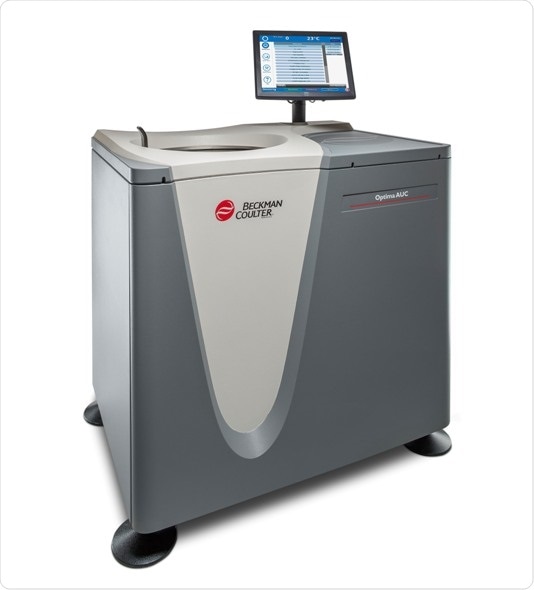Combines the Power of a Centrifuge with Advanced Optical Detection Capabilities
Beckman Coulter Life Sciences returns analytical ultracentrifugation (AUC) to the center of protein research and macromolecule characterization with the next-generation Optima AUC. The instrument is now available for use in labs around the world, and will be available for hands on interaction during the 61st Annual Meeting of the Biophysical Society, February 12-14, in New Orleans.

Image credit: Beckman Coulter
AUC is a technique that enables molecules to float freely and unbound so they can be characterized in their native state. This method is useful for a range of applications, from determining protein molecular weight and binding efficiencies, to characterizing nanoparticle size and payload. Because its optical system enables precise analysis at up to 20 discrete wavelengths, the Optima AUC makes it easier for researchers to study complex systems, and to determine formulation, heterogeneity, molecular weight and binding efficiencies in a single experiment—and in less time than with earlier AUC technology.
For Colleges in the Community Day on Sunday, February 12, local undergraduate students at the Biophysical Annual Meeting will get the chance to experience a 10-minute, hands-on introduction to the Optima AUC. In addition, they can learn how to enter to win a scholarship to attend AUC 2017 this fall, sponsored by Beckman Coulter Life Sciences.
On Monday, February 13, AUC Beckman Coulter Product Manager Dr. Chad Schwartz will give a presentation titled “What Goes Around, Comes Around: Unveiling the Optima AUC.” Following a brief overview of AUC fundamentals, Dr. Schwartz will explain how the Optima AUC improves on its predecessor, the ProteomeLab XL-A/XL-I (also from Beckman Coulter).
“With faster scanning rates, increased wavelength precision and enhanced data resolution,” Schwartz says, “the Optima AUC can provide more accurate answers from each run. In fact, at rotor speeds up to 60,000 RPM, data acquisition rates on the Optima AUC are almost five times faster than the ProteomeLab XL-A/XL-I, with three times higher radial resolution, so it can generate nearly 15 times more data.”
The Optima AUC currently provides absorbance and/or interference optical systems, with the option to install up to three independent, simultaneous detection systems. Unlike the ProteomeLab XL-A/XL-I, however, all system optics are contained outside the rotor chamber, making the Optima AUC easier to clean.
A 15-inch (38 cm) touchscreen display indicates the progression of experimental designs, while remote monitoring capabilities let researchers set up, monitor and extract experiment data from virtually any location.
Though compatible with widely used analytical software (e.g., UltraScan, SEDFIT/SEDPHAT, SEDANAL, DCDT+), and the same cells and rotors used with the ProteomeLab XL-A/XL-I, the Optima AUC surpasses other features of its forerunner, including:
- A 300 Hz absorbance flash lamp
- 2048 x 1088-pixel resolution from the charge-coupled device (CCD) camera
- The capability to yield scans on ≥ 10 interference fringes/cell
“Researchers constantly push the boundaries of science, so they need increased precision and reproducibility from their analytical instruments,” says Dr. Schwartz. “With its advanced optical detection capabilities, no other technique can provide the same range of information with this level of precision and accuracy,” he adds.
“And because the Optima AUC delivers data faster than ever before, scientists can now make important discoveries in less time.”
Those interested in learning more about the Optima AUC, as well as other particle characterization technology from Beckman Coulter Life Sciences, can visit Booth #101 at the Annual Biophysical Meeting. The Optima AUC will also be present at Pittcon, Booth #2620, March 5-9 in Chicago, IL.
Source: http://www.beckman.com/